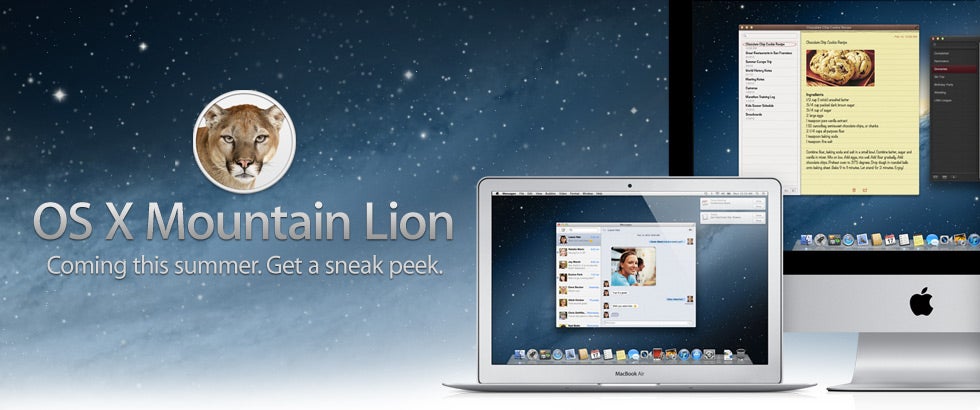Apple unveils OS X Mountain Lion borrowing heavily from iPad

We would usually skip on reporting about Mac OS X, which Apple now refers to mostly as OS X, but this particular news piece is different - it shows some important changes in the way Cupertino unveils its novelties, and draws an interesting vector for the possible development of iOS.
First of all, Apple has announced OS X Mountain Lion, a major update to OS X Lion, that’s about to ship in the summer of 2012. The company is also adopting a plan to update the operating system for Macs on a yearly basis. Major novelties are integration of iCloud along with many other things borrowed from iOS - Notification Center, Game Center, iMessage support with an app called Messages, AirPlay Mirroring, a Notes app, Reminders and deep Twitter integration. Overall, Apple is fortifying an ecosystem of three form factors - iPhone/iPod, iPad and Mac by introducing features like free messaging to Mac as well.
Now, the announcement itself is interesting as it brings , but what we find to really show a change in Apple is the way it was served - in tete-a-tete meetings with journalists hosted by none other than Phil Schiller, head of marketing at Apple.

Schiller has allegedly visited the East Coast to personally brief famous bloggers writing about Apple. What’s striking is just how official and well prepared Schiller was, according to John Gruber who detailed his meeting with Schiller in a blog post.
“We’re starting to do some things differently,” Phil Schiller said to Gruber.
Let’s try and draw some conclusions from the very fact that Schiller is spending the time to personally brief journalists, something unprecedented for Apple and actually any other tech company we can think of. First of all it illustrates the deep and personal relationship between Apple and writers who have been covering the company for ages. It’s precious time with the company’s big honchos which creates a unique bond.
Secondly, it shows commitment to Mac OS X as a platform fundamentally different from iOS yet still developing in parallel rather than opposite to iOS. It’s an opportunity for Apple to announce it without wasting one of its highly anticipated press events. It also shows that Cupertino has strong focus on its main products like the iPad and iPhone, a focus it doesn’t want to dilute with additional events.
Last, but not least, there is one new addition in OS X Mountain Lion that would be very welcome to iOS. The feature is called “Gatekeeper” and allows devs to sign for Apple developer IDs for free. They can then use the ID to sign applications. The apps they submit don’t need to get assessed by Apple, but if they turn out to be malware, Apple can easily remove a developer’s app or account. This seems like a thing Apple can use so developers self-censor their applications, and ultimately get them rid of long app approval times.
Overall, we can see that Apple is undergoing some changes. We’re not sure whether the novelties of the new OS X like Gatekeeper will transcend to iOS, but the two platforms are obviously very close to each other, while keeping a distinct separation line and that seems like the way it’s going to stay in the near future. Hit the source link for a brief look at Mountain Lion and how similar it has grown to iOS.
source: Apple, Daring Fireball

Apple Releases OS X Mountain Lion Developer Preview with Over 100 New Features
CUPERTINO, California—February 16, 2012—Apple® today released a developer preview of OS X® Mountain Lion, the ninth major release of the world’s most advanced operating system, which brings popular apps and features from iPad® to the Mac® and accelerates the pace of OS X innovation. Mountain Lion introduces Messages, Notes, Reminders and Game Center to the Mac, as well as Notification Center, Share Sheets, Twitter integration and AirPlay® Mirroring. Mountain Lion is the first OS X release built with iCloud® in mind for easy setup and integration with apps. The developer preview of Mountain Lion also introduces Gatekeeper, a revolutionary security feature that helps keep you safe from malicious software by giving you complete control over what apps are installed on your Mac. The preview release of Mountain Lion is available to Mac Developer Program members starting today. Mac users will be able to upgrade to Mountain Lion from the Mac App Store™ in late summer 2012.“The Mac is on a roll, growing faster than the PC for 23 straight quarters, and with Mountain Lion things get even better,” said Philip Schiller, Apple’s senior vice president of Worldwide Marketing. “The developer preview of Mountain Lion comes just seven months after the incredibly successful release of Lion and sets a rapid pace of development for the world’s most advanced personal computer operating system.”
The developer preview of Mountain Lion features the all new Messages app which replaces iChat® and allows you to send unlimited messages, high-quality photos and videos directly from your Mac to another Mac or iOS device. Messages will continue to support AIM, Jabber, Yahoo! Messenger and Google Talk. Starting today Lion users can download a beta of Messages from www.apple.com, and the final version will be available with Mountain Lion. Reminders and Notes help you create and track your to-dos across all your devices. Game Center lets you personalize your Mac gaming experience, find new games and challenge friends to play live multiplayer games, whether they’re on a Mac, iPhone®, iPad or iPod touch®.
Mountain Lion presents notifications in an elegant new way, and Notification Center provides easy access to alerts from Mail, Calendar, Messages, Reminders, system updates and third party apps. System-wide Share Sheets make it easy to share links, photos and videos directly from Apple and third party apps. Twitter is integrated throughout Mountain Lion so you can sign on once and tweet directly from Safari®, Quick Look, Photo Booth®, Preview and third party apps. Mountain Lion also introduces AirPlay Mirroring, an easy way to wirelessly send a secure 720p video stream of what's on your Mac to an HDTV using Apple TV®.
More than 100 million users have iCloud accounts, and Mountain Lion makes it easier than ever to set up iCloud and access documents across your devices. Mountain Lion uses your Apple ID to automatically set up Contacts, Mail, Calendar, Messages, FaceTime® and Find My Mac. The new iCloud Documents pushes any changes to all your devices so documents are always up to date, and a new API helps developers make document-based apps work with iCloud.
Gatekeeper is a revolutionary new security feature that gives you control over which apps can be downloaded and installed on your Mac. You can choose to install apps from any source, just as you do on a Mac today, or you can use the safer default setting to install apps from the Mac App Store, along with apps from developers that have a unique Developer ID from Apple. For maximum security, you can set Gatekeeper to only allow apps from the Mac App Store to be downloaded and installed.
Mountain Lion also has features specifically designed to support Chinese users, including significant enhancements to the Chinese input method and the option to select Baidu search in Safari. Mountain Lion makes it easy to set up Contacts, Mail and Calendar with top email service providers QQ, 126 and 163. Chinese users can also upload video via Share Sheets directly to leading video websites Youku and Tudou, and system-wide support for Sina weibo makes microblogging easy.
Hundreds of new APIs give developers access to new core technologies and enhanced features within OS X. The Game Kit APIs tap into the same services as Game Center on iOS, making it possible to create multiplayer games that work across Mac, iPhone, iPad and iPod touch. A new graphics infrastructure underpins OpenGL and OpenCL and implements GLKit, first introduced in iOS 5, to make it easier to create OpenGL apps. Using Core Animation in Cocoa apps is easier than ever, and new video APIs deliver modern 64-bit replacements for low-level QuickTime APIs. Enhanced Multi-Touch™ APIs give developers double-tap zoom support and access to the system-wide lookup gesture. Kernel ASLR improves security through enhanced mitigation against buffer overflow attacks.
Apple designs Macs, the best personal computers in the world, along with OS X, iLife, iWork and professional software. Apple leads the digital music revolution with its iPods and iTunes online store. Apple has reinvented the mobile phone with its revolutionary iPhone and App Store, and is defining the future of mobile media and computing devices with iPad.













Things that are NOT allowed: